
Ibrahim Ahmed Mahmoud al Qosi is a Sudanese militant and paymaster for al-Qaeda. Qosi was held from January 2002 in extrajudicial detention in the United States Guantanamo Bay detainment camps, in Cuba. His Guantanamo Internment Serial Number is 54.
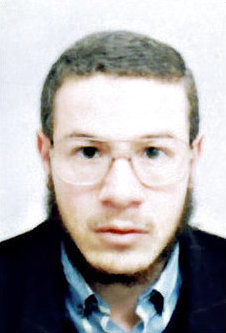
Sabir Mahfouz Lahmar is a Bosnian citizen, who won his habeas corpus petition in United States federal court after being held for eight years and eight months in the military Guantanamo Bay detainment camps, in Cuba.
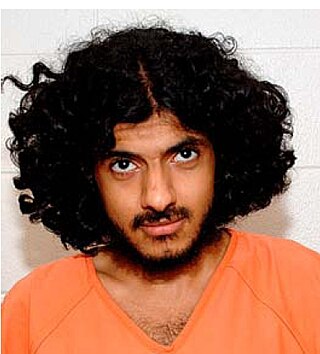
Hassan Muhammad Salih bin Attash is a citizen of Saudi Arabia, held by the United States in the Guantanamo Bay detention camp in Cuba. Joint Task Force Guantanamo counter-terrorism analysts estimate that bin Attash was born in 1985, in Jeddah, Saudi Arabia.

Faiz Mohammed Ahmed Al Kandari is a Kuwaiti citizen who was held in extrajudicial detention in the United States' Guantanamo Bay detainment camp in Cuba, from 2002 to 2016. He has never been charged with war crimes.

Said Salih Said Nashir is a citizen of Yemen, held in extrajudicial detention in the United States Guantanamo Bay detainment camps, in Cuba. His Internment Serial Number is 841.
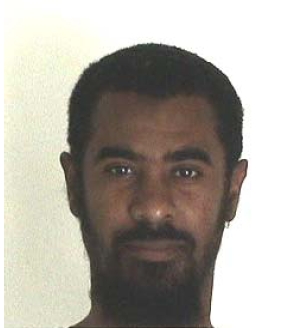
Sulaiman Awath Sulaiman Bin Ageel Al Nahdi is a citizen of Yemen, who held in extrajudicial detention in the United States Guantanamo Bay detainment camps, in Cuba, from May 5, 2002, until November 16, 2015. Al Nahdi's Guantanamo Internment Serial Number is 511. The Department of Defense reports that al Nahdi was born on December 1, 1974, in Mukalla, Yemen.

Muhammad Ahmad Abdallah al-Ansi is a citizen of Yemen, held in extrajudicial detention in the United States Guantanamo Bay detention camps, in Cuba. His Guantanamo Internee Security Number is 029. American intelligence analysts estimate he was born in 1975, in Sanaa, Yemen. He was cleared for release on December 9, 2016, a recommendation made public on December 22. He was transferred to Oman with nine other men on January 16, 2017.
Samir Naji al Hasan Moqbel is a citizen of Yemen who was held in extrajudicial detention in the United States's Guantanamo Bay detention camps, in Cuba. His Guantanamo Internee Security Number was 043. The Department of Defense reports Moqbel was born on December 1, 1977, in Taiz, Yemen.
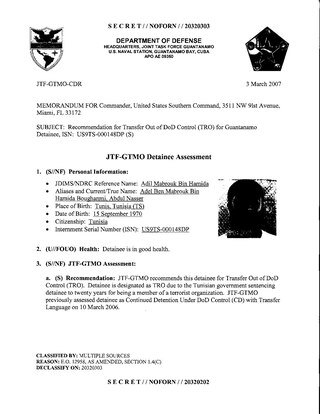
Adel Ben Mabrouk is a citizen of Tunisia who was held in extrajudicial detention at the United States' Guantanamo Bay detainment camps, in Cuba, from March 2002 to November 2009. Mabrouk had outstanding warrants in Italy, and shortly after his arrival in November 2009, Italian prosecutors laid charges against him.

Ha'il Aziz Ahmad Al Maythal is a citizen of Yemen, who was held in extrajudicial detention in the United States Guantanamo Bay detention camp, in Cuba. American intelligence analysts estimate that he was born in 1977, in Zemar, Yemen.

Moath Hamza Ahmed al-Alwi is a citizen of Yemen, held in extrajudicial detention in the United States Guantanamo Bay detainment camps, in Cuba. His detainee ID number is 28. Guantanamo analysts estimated he was born in 1977, in Al Hudaydah, Yemen.

Ibrahim Othman Ibrahim Idris was a citizen of Sudan, formerly held in extrajudicial detention in the United States' Guantanamo Bay detainment camps, in Cuba. His detainee ID number was 036.

Tarek Ali Abdullah Ahmed Baada is a citizen of Yemen, who was formerly held in extrajudicial detention in the United States Guantanamo Bay detainment camps, in Cuba. His detainee ID number is 178. Joint Task Force Guantanamo counter-terrorism analysts estimated that Baada was born in 1978 in Shebwa, Yemen.
Adil Hadi al Jazairi Bin Hamlili is a citizen of Algeria who was held in extrajudicial detention in the United States Guantanamo Bay detainment camps, in Cuba. The US Department of Defense reports that Bin Hamlili was born on 26 June 1976, in Oram (Oran) [sic] Algeria. His Guantanamo Internment Serial Number was 1452.
Sami bin Khamis bin Salih Essid a.k.a. Essid Sami Ben Khemais was the head of al-Qaeda's Italian cell until his arrest outside Milan in April 2001. He received a five-year sentence for trafficking in arms, explosives, and chemicals. Essid remains under embargo by the United Nations Security Council Committee 1267 as an affiliate of al-Qaeda, and by the US Treasury for his terrorist activity. Around 1 July 2007, fresh charges against Sami Essid were read in Italy, where he was still in custody.
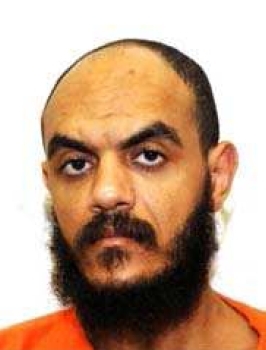
Abdul Rahman Shalabi is a citizen of Saudi Arabia held in extrajudicial detention in the United States Guantanamo Bay detention camps, in Cuba. His Guantanamo Internee Security Number is 42.

Omar Said Salim Al Dayi, also known as Omar Said Salem Adayn and Omer Saeed Salem Al Daini, is held in extrajudicial detention in the United States Guantanamo Bay detention camps, in Cuba. His Guantanamo Internee Security Number is 549.

Muhammed Murdi Issa Al Zahrani is a citizen of Saudi Arabia who was held in the United States's Guantanamo Bay detention camps, in Cuba from August 5, 2002, until November 22, 2014. His Guantanamo Internment Serial Number was 713. Joint Task Force Guantanamo counter-terrorism analysts estimate he was born in 1969, in Taif, Saudi Arabia.
A group of prisoners at the Guantanamo Bay detention camp, the Dirty Thirty were believed to be the "best potential sources of information" and consequently the chief focus of the harshest methods of interrogation. Many of these captives were alleged to be Osama bin Laden bodyguards, or associates of Osama bin Laden.
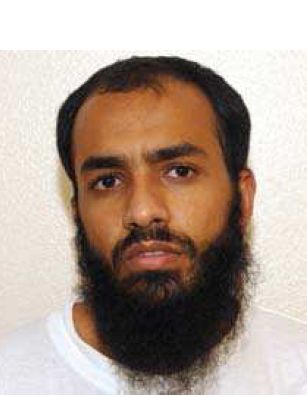
Muhammaed Yasir Ahmed Taher was a citizen of Yemen, who was held in extrajudicial detention in the United States's Guantanamo Bay detention camps, in Cuba. His Guantanamo Internment Serial Number was 679. American intelligence analysts estimate he was born in 1980, in Ibb, Yemen.

















